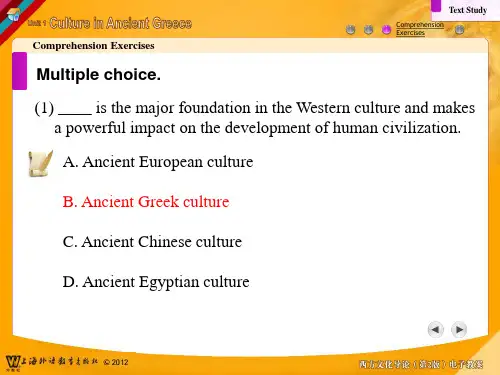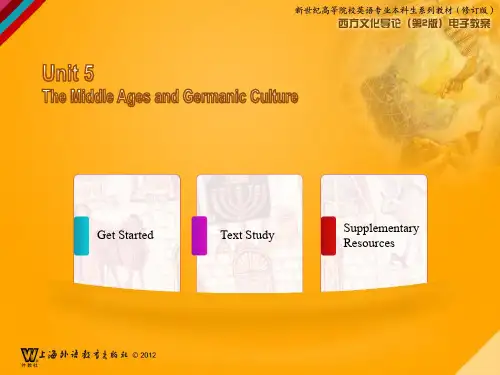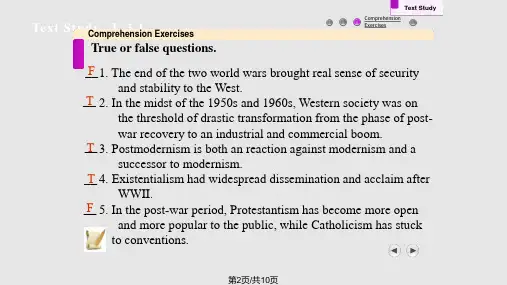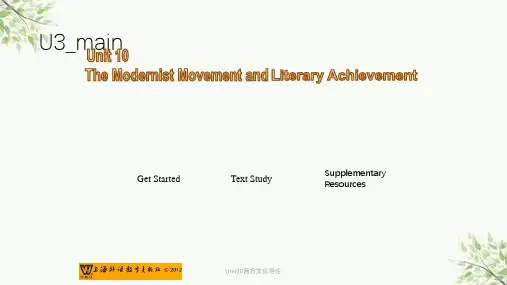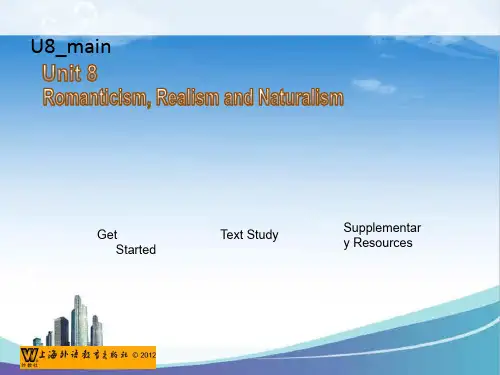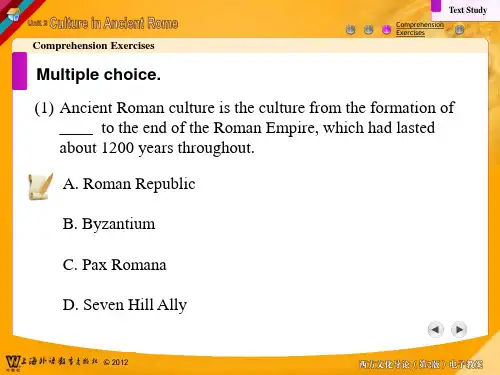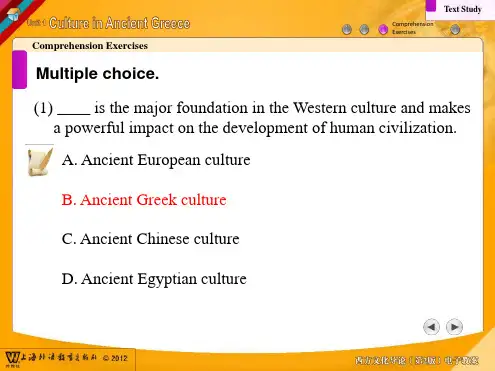西方文化导论Unit
- 格式:pptx
- 大小:918.62 KB
- 文档页数:10
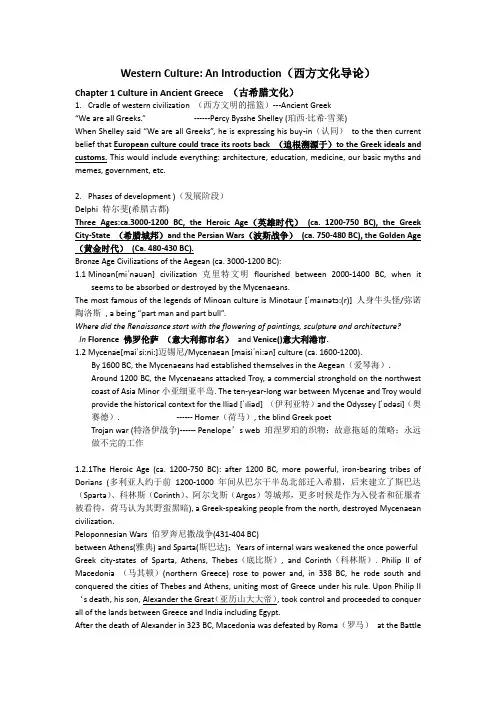
Western Culture: An Introduction(西方文化导论)Chapter 1 Culture in Ancient Greece (古希腊文化)1.Cradle of western civilization (西方文明的摇篮)---Ancient Greek“We are all Greeks.”------Percy Bysshe Shelley (珀西·比希·雪莱)When Shelley said “We are all Greeks”, he is expressing his buy-in(认同)to the then current belief that European culture could trace its roots back (追根溯源于)to the Greek ideals and customs. This would include everything: architecture, education, medicine, our basic myths and memes, government, etc.2.Phases of development )(发展阶段)Delphi 特尔斐(希腊古都)Three Ages:ca.3000-1200 BC, the Heroic Age(英雄时代)(ca. 1200-750 BC), the Greek City-State (希腊城邦)and the Persian Wars(波斯战争)(ca. 750-480 BC), the Golden Age (黄金时代)(Ca. 480-430 BC).Bronze Age Civilizations of the Aegean (ca. 3000-1200 BC):1.1Minoan[miˈnəuən] civilization 克里特文明flourished between 2000-1400 BC, when itseems to be absorbed or destroyed by the Mycenaeans.The most famous of the leg ends of Minoan culture is Minotaur [ˈmaɪnətɔ:(r)] 人身牛头怪/弥诺陶洛斯, a being “part man and part bull”.Where did the Renaissance start with the flowering of paintings, sculpture and architecture?In Florence 佛罗伦萨(意大利都市名)and Venice()意大利港市.1.2Mycenae[maiˈsi:ni:]迈锡尼/Mycenaean [maisiˈni:ən] culture (ca. 1600-1200).By 1600 BC, the Mycenaeans had established themselves in the Aegean(爱琴海).Around 1200 BC, the Mycenaeans attacked Troy, a commercial stronghold on the northwest coast of Asia Minor小亚细亚半岛. The ten-year-long war between Mycenae and Troy would provide the historical context for the Iliad [ˈɪliəd] (伊利亚特)and the Odyssey [ˈɒdəsi](奥赛德). ------ Homer(荷马), the blind Greek poetTrojan war (特洛伊战争)------ Penelope’s web 珀涅罗珀的织物;故意拖延的策略;永远做不完的工作1.2.1The Heroic Age (ca. 1200-750 BC): after 1200 BC, more powerful, iron-bearing tribes of Dorians (多利亚人约于前1200-1000年间从巴尔干半岛北部迁入希腊,后来建立了斯巴达(Sparta)、科林斯(Corinth)、阿尔戈斯(Argos)等城邦,更多时候是作为入侵者和征服者被看待,荷马认为其野蛮黑暗), a Greek-speaking people from the north, destroyed Mycenaean civilization.Peloponnesian Wars 伯罗奔尼撒战争(431-404 BC)between Athens(雅典) and Sparta(斯巴达);Years of internal wars weakened the once powerful Greek city-states of Sparta, Athens, Thebes(底比斯), and Corinth(科林斯). Philip II of Macedonia (马其顿)(northern Greece) rose to power and, in 338 BC, he rode south and conquered the cities of Thebes and Athens, uniting most of Greece under his rule. Upon Philip II ‘s death, his son, Alexander the Great(亚历山大大帝), took control and proceeded to conquer all of the lands between Greece and India including Egypt.After the death of Alexander in 323 BC, Macedonia was defeated by Roma(罗马)at the Battleof Cynoscephalae(基诺斯山战役)in 197 BC and then again at the Battle of Pydna(皮德纳战役)in 168 BC. The Greeks were finally defeated at the Battle of Corinth in 146 BC. Rome completely destroyed and plundered(掠夺)the city of Corinth as an example to other Greek cities.1.2.2The Greek City-State and the Persian Wars (ca. 750-480 BC)In 490 BC, Battle of Marathon 马拉松战役In 480 BC, Battle of the Hot Gates and Battle of Salamis 萨拉米斯海战Persian Wars(希波战争): Herodotus 希罗多德(ca. 485-425 BC), the father of history 历史之父。
